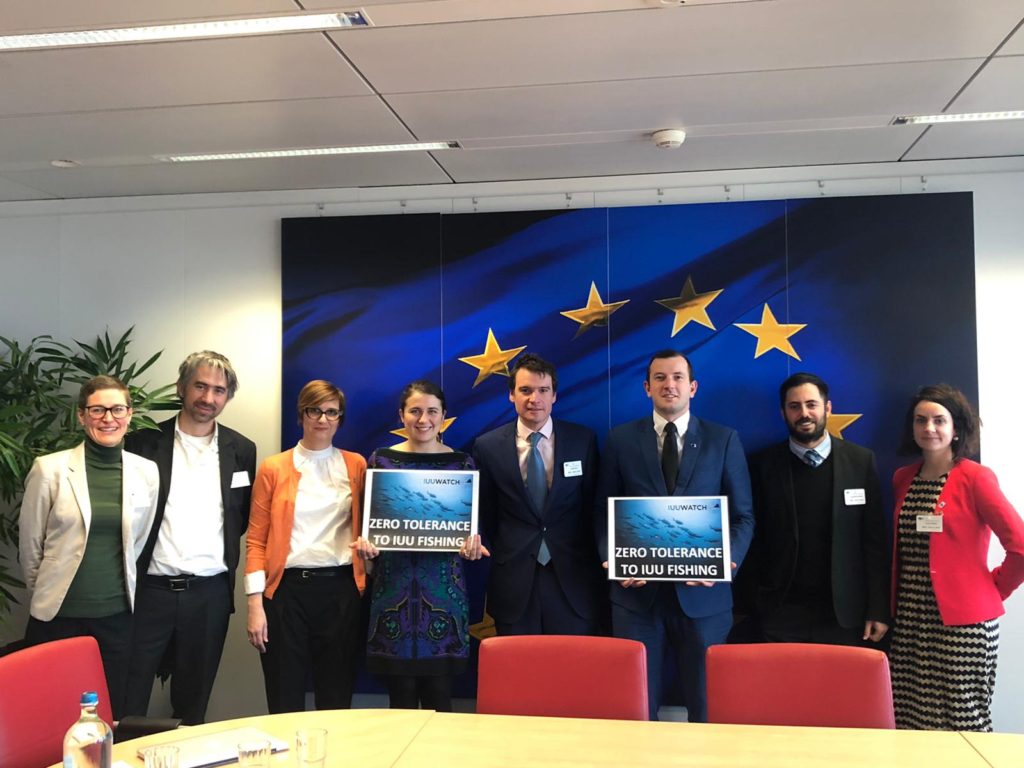Illegal, unreported and unregulated (IUU) fishing depletes fish stocks, weakens economies, and undermines conservation and management efforts. It also jeopardises the livelihoods of the world’s most vulnerable communities and costs the global economy tens of billions of euros annually. Strengthening fisheries governance is urgently required to deliver the United Nations Sustainable Development Goals agenda. Particularly target 14.4, which outlines the need to “effectively regulate harvesting, and end overfishing, IUU fishing and destructive fishing practices (…)”, something the European Union (EU) has committed to deliver by 2030.
Over the past decade, the EU has been a leader in the fight against IUU fishing worldwide. The EU IUU Regulation is the most far-reaching and influential system of its kind in operation today and has been instrumental in improving international ocean governance. Therefore, we were pleased to see a zero-tolerance approach to IUU fishing so prominent in the Commissioner’s priorities, as well as referenced in the Commission’s communication on the European Green Deal. Ending IUU fishing and improving sustainable fisheries governance will not only support the growth of sustainable blue economies and help protect vulnerable marine life, but also help mitigate the impacts of climate change. Achieving that requires urgent action both at the global level and here at home.
On 29 January 2020, the EU IUU Coalition (the Environmental Justice Foundation (EJF), Oceana, The Pew Charitable Trusts, The Nature Conservancy (TNC) and WWF) met with Commissioner for Environment, Oceans and Fisheries Virginijus Sinkevičius to discuss priorities to tackle IUU fishing.
Globally, the EU and its Member States, through their collective influence as the world’s largest seafood market and major flag States, are in a unique position to set an example and drive change. They can inspire action driving lasting fisheries reforms and introduce best practices globally, including via international and regional fora such as Regional Fisheries Management Organisations (RFMOs). For more information please find here a recent report. While the EU has been a global leader in the fight against IUU fishing, in particular with the EU IUU Regulation, much more remains to be done such as:
- Promoting robust import control systems, especially in the three main seafood market States (the EU, the US and Japan), which represent two thirds of the global seafood market. This will create a level playing field and prevent unsustainable seafood products from moving across regions.
- Pushing for increased transparency in fishing activities worldwide, including by strengthening International Maritime Organization (IMO) number requirements and tackling the issue of “flags of convenience”, which will ensure that operators involved in IUU fishing do not escape regulations.
At the same time, in order to credibly influence regulation and enforcement in third countries, the EU must engage in further scrutiny internally. The zero-tolerance approach should apply to EU Member States, especially at a time when the EU Fisheries Control System is undergoing revision. To strengthen implementation and improve compliance, we ask the EU and its Member States to:
- Mandate the use of CATCH, the new IT system that aims to digitise the currently paper-based EU catch certification scheme for imported seafood, and introduce electronic risk assessment criteria to the process. Using the CATCH system will also enhance harmonisation of import controls among EU Member States and avoid the diversion of IUU products to ports of entry with less stringent control systems.
- Increase the information requirements for fisheries products imported into the EU, such as the catch area and fishing gear, as well as requiring that an IMO number or other unique vessel identification (if an IMO number is not applicable) are recorded on catch certificates.
- Ensure that the revised sanctioning regime is strengthened, not weakened, by being an effective deterrent and by creating a culture of compliance with key provisions currently in place (e.g. penalty point system, serious infringements, immediate enforcement measures and accompanying sanctions).
- Strengthen the serious infringement “supplying services to operators connected to a vessel engaged in IUU fishing” to include “benefitting from, supporting or engaging in IUU fishing including as operators, effective beneficiaries, owners, logistics and service providers, including insurance providers and other financial service providers ”. This would require Member States to investigate IUU fishing links of service providers as well as beneficial owners.
- Ensure that small scale vessels are fitted with devices to track their fishing activity and have a robust reporting mechanism for catches and landings.
- Require Remote Electronic Monitoring (REM) to allow for the monitoring and control of the Landing Obligation’s effective implementation. We recommend to further expand the legal basis for the use of REM in the EU or by EU vessels to ensure that it could also be consistently implemented by operators for other purposes for example, to improve bycatch management or data collection.
- Provide more transparency on Member State enforcement of the Control Regulation. We need more public information on the actions taken by Member States when there are infringements or lack of action. Annually, Member States should publish aggregated data on the number and types of inspections, number of infringements detected and reported, and type of follow-up actions (simple warnings, administrative sanctions, criminal sanctions, immediate enforcement measures, and number of penalty points administered).
While much has been achieved over the past 10 years, IUU fishing still remains a major threat to marine ecosystems, law-abiding fishers and the blue economy. According to Commissioner Sinkevičius, in order to stop IUU fishing it is imperative that the international community tackle it as a whole (socially, economically and ecologically). We welcome his desire for the EU to continue leading this fight internationally, and his reaffirmation of a zero-tolerance approach within and outside the EU, recognising the critical role of transparency and traceability in this endeavour. The EU IUU Coalition was encouraged by these initial discussions and Commissioner Sinkevičius’ commitment, and we look forward to working together to improve transparency in global ocean governance.

